Shiba Inu, the “little brushwood dog,” or just Shiba for short, became a national treasure in Japan in 1936. This breed, one of the oldest surviving dog breeds with DNA closely related to wolves, traces its origins back to 7,000 BCE.
World War II’s adversities nearly led to Shiba Inus’s extinction, but three surviving bloodlines preserved the breed. All modern Shiba Inus trace their lineage back to these bloodlines, showcasing the breed’s resilience over the centuries.
Initially hunters of birds and small game, they now mainly serve as beloved pets. However, all of the above factors contribute to quite high prices of purchasing a Shiba Inu. On top of that, in the U.S., the breed’s popularity was further boosted by cryptocurrencies like Dogecoin and Shiba Inu, which use this dog as their logo. This, together with the fact that reputable breeders are often few and far between, can make finding a well-bred Shiba challenging.
Here we’ll explore exactly how much you can expect to pay for a Shiba Inu, as well as the other expenses that come with owning one. Let’s get to it!
How Much Does a Shiba Puppy Cost?
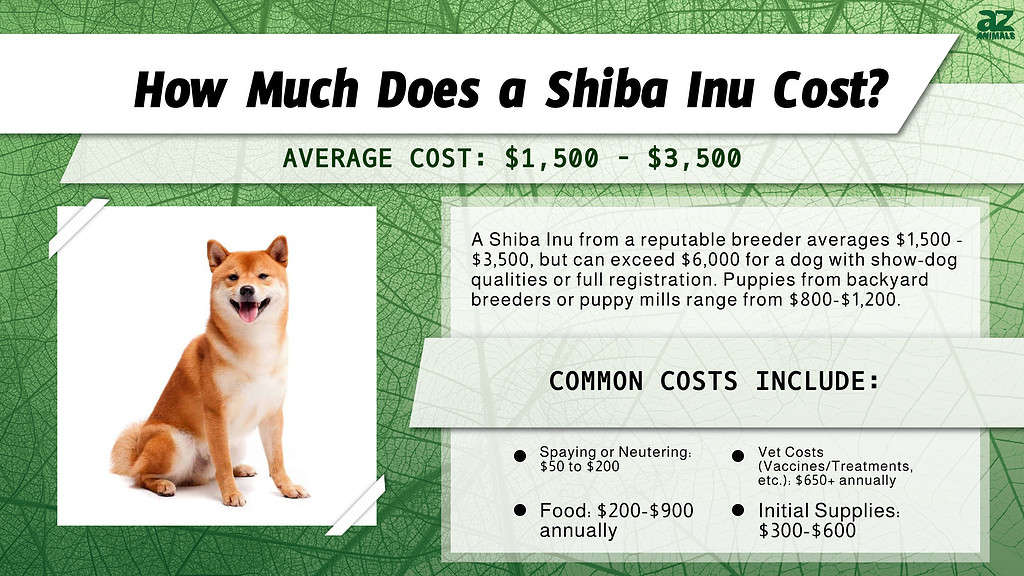
The growing demand for Shiba Inu puppies has led to a supply shortage from ethical breeders, paving the way for puppy mills and backyard breeders who often compromise animal well-being. Additionally, the shortage also affected the cost of purchasing a Shiba — and not in the way you’re probably hoping it did.
The cost of a reputable-bred Shiba Inu puppy at the beginning of the year started at $1,500 and rose to $2,000 as of mid-2024 due to inflation. Prices can escalate further, starting around $3,500 and potentially exceeding $6,000 if the puppy has show-dog qualities and comes with full registration.
A puppy with limited registration, commonly offered by ethical breeders, averages around $2,400 and is meant for companionship, not showing or breeding. Limited registration provides lineage information but restricts show participation. In contrast, full registration, offered to experienced owners for puppies with show-dog potential, allows participation in confirmation shows.
Reputable breeders usually mandate a signed contract for spaying or neutering the puppy and often struggle to meet demand due to Shiba Inus’ small litter sizes. It’s advisable to seek such breeders through the National Shiba Club in America’s Breeder Directory, particularly those recognized with the American Kennel Club Breeder of Merit Badge.
Puppies from puppy mills or backyard breeders, although initially cheaper and averaging between $800 and $1,200, often incur higher long-term medical costs due to a higher incidence of severe diseases, including hip dysplasia, glaucoma, and seizures. The shortage of reputable breeders and their high prices, however, may inadvertently direct many buyers to these less ethical sources. This further emphasizes the need for doing thorough research to find a responsible breeder and avoid future hardships.
It’s also worth noting that Shiba Inu mix puppies may be slightly cheaper than purebred Shibas. A Shiba Inu mix is a type of dog resulting from breeding a Shiba Inu with another breed, such as the Labrador, Welsh Corgi, and Jack Russell Terrier. The prices of such puppies may range anywhere between $50 and $1,000.
Other Factors That Influence the Shiba Inu Prices
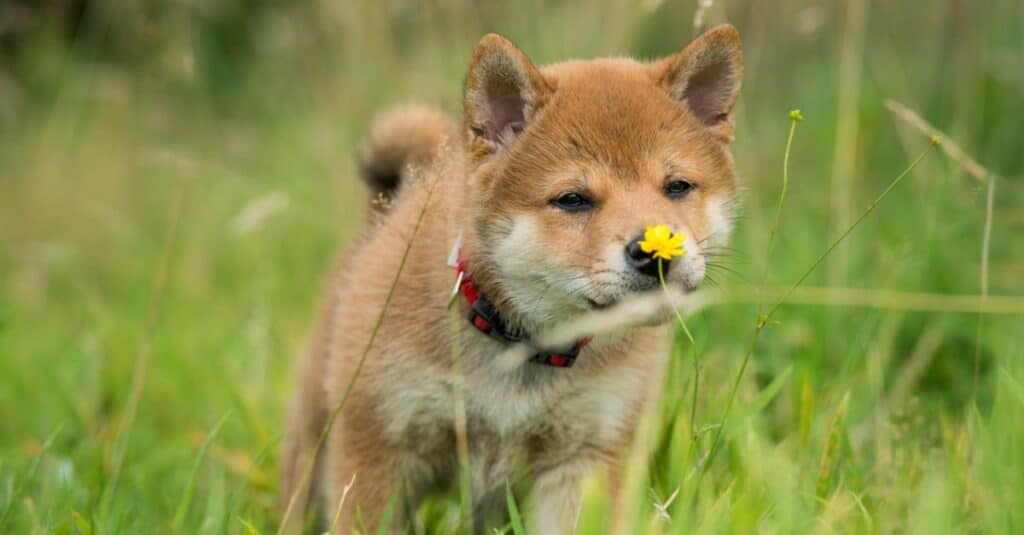
Purchasing a Shiba Inu puppy will likely be more expensive in 2024 than in previous years.
©iStock.com/Kurt Pas
Various factors like gender, coat color, and lineage further influence the price of a Shiba puppy. For instance, females and red-coated puppies are usually more expensive, while cream or long-coated Shiba Inus are cheaper. Some breeders sell long-haired Shiba puppies at higher premium prices, but this can be a red flag for unethical breeding practices. While reputable breeders might occasionally produce such coats, they would not charge extra for them.
Also, breeders in major metropolitan areas typically charge more for their dogs than breeders in rural areas. This is simply because the cost of living is higher in major cities, and breeders often decide to pass these costs on to their customers. In other words, the price won’t necessarily reflect the “quality” of a dog, just the breeder’s expenses. So, if you’re considering getting a Shiba, you may want to check out breeders from less populated areas.
Finally, if you’re considering importing a dog from Japan, note that this will surely cost way more than buying one in the U.S. You should budget for import fees, transportation, broker fees, possible quarantine, and health testing costs in advance.
Adoption
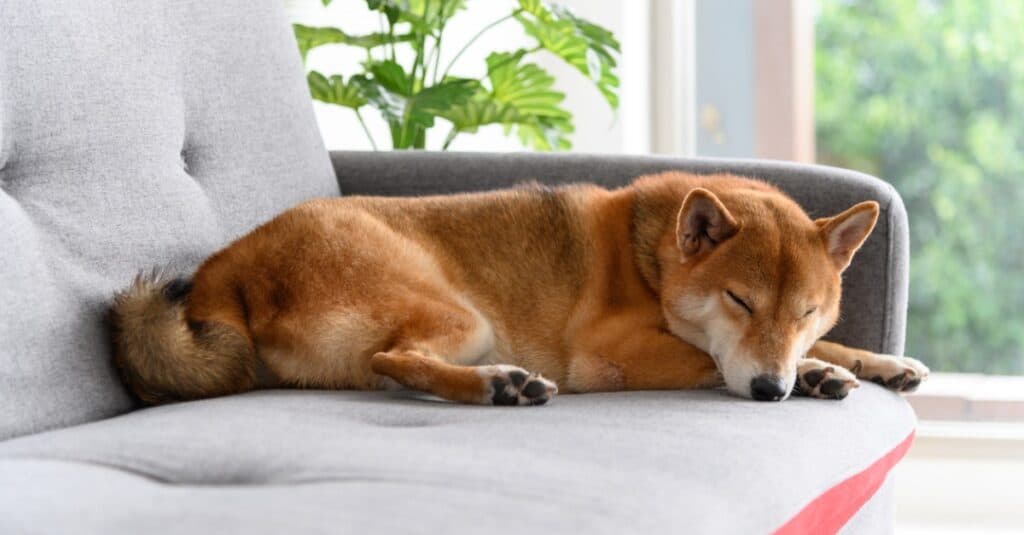
Adopting instead of buying isn’t just cheaper; it’s also rewarding.
©iStock.com/Pratchaya
Another way to get a Shiba Inu for cheaper is through adoption. If you are considering this option, you can check out the list of US Shiba Rescue Organizations nationwide put together by the National Shiba Inu Club Of America. Adoption fees for adult dogs typically range from $150 to $400, but it’s rare to find Shiba Inu puppies in rescue organizations. On the rare occasion they do become available, the adoption fee tends to be higher.
Cost of Vaccination and Other Medical Expenses for Shiba Inus
Common health issues in Shiba Inu include hip dysplasia, eye problems, and patellar luxation. Routine vet visits are crucial for maintaining your Shiba Inu’s health and identifying potential issues early, preventing them from escalating into serious, expensive problems.
Shiba Inu puppies require multiple vet visits and vaccinations in their first year. Once they transition into adulthood, the costs and frequency of vet visits should decrease. On average, you should get your Shiba assessed by a vet annually during adulthood and semi-annually during their senior years.
Here is a breakdown of estimated veterinary costs:
- Annual Visits: $200
- Vaccinations: $50 (per vaccine; you may need to pay administration fees on top of that)
- Flea, tick, and heartworm prevention: $175
- Miscellaneous vet expenses: $200
- Spay/Neuter: $50-$200
- Yearly veterinary service and medication total estimate: $675-$825
Cost of Food and Supplies for Shiba Inus
You should also not underestimate the cost of food and other supplies you’ll need to provide for your Shiba.
#1: Food
You will spend a significant portion of your annual dog budget on dog food. The cost, however, can vary significantly based on the quality of food you decide to get, with higher-quality food typically being pricier. The food-related costs will also depend on other factors, such as how much your dog eats.
An adult Shiba will eat between one and one and a half cups of kibble per day; Shiba Inu puppies have smaller stomachs, but puppy food tends to be more expensive. Nevertheless, it’s vital to ensure your pup consumes a veterinary-approved diet suitable for their life stage, transitioning from a puppy to an adult diet and eventually to a senior diet as needed. A well-balanced, nutritious diet is crucial for optimal growth, weight maintenance, and prevention of illnesses caused by poor nutrition at any life stage.
Here is a breakdown of estimated annual costs based on the type of dog food:
- Average/Budget kibble: $200
- Premium kibble: $600-$900
Fresh, homemade/raw nutrition:
- Buying ready-made: $1,700
- Making it yourself: $1,000
#2: Dog Care Services
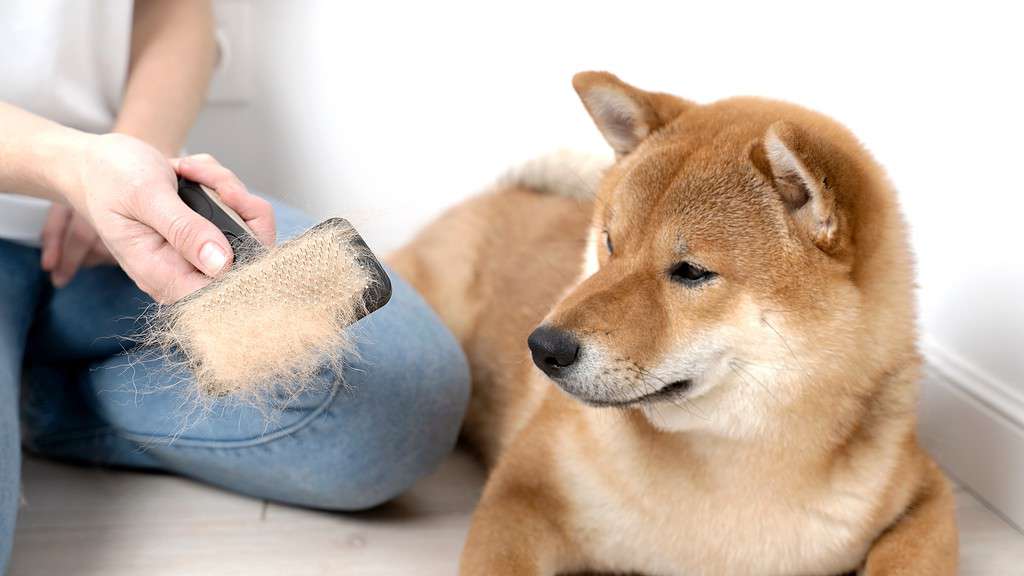
Shiba Inus shed a lot year-round, but only long-coated varieties need regular brushing.
©Ultraskrip/Shutterstock.com
Dog care services such as daycare, walking, and grooming are optional but can significantly impact your annual budget if you need them. It’s essential to ensure your Shiba Inu receives enough attention, exercise, and social interaction, especially if you have a full-time job. Leaving dogs alone for extended periods can distress them, as they thrive on social interaction.
Continued training for your Shiba Inu is advisable, not just during puppyhood but throughout its life. You can achieve this through occasional in-person classes, books, videos, training memberships, and online training courses.
Here’s a breakdown of estimated annual costs for dog care services:
- Daycare (full day, five times a week): $5,000
- Dog walking: $20 per session (frequency depends on personal need)
- Dog grooming: $30-$50 per session
The total cost for pet services like daycare, walking, and grooming can range significantly from $100 to $5,500 per year, depending on the frequency of use and the chosen service providers.
#3: Miscellaneous Supplies
Miscellaneous costs include supplies and toys that need to be replenished or replaced periodically. This can vary a lot depending on where you live, what stores you prefer, and how much you’re willing to spend. The price can range from $300 to $600 per year.
Some of these items include:
- Shampoo
- Leash/collar
- Poop bags, wipes
- Toys, games
- Dog treats
- Grooming tools (e.g., brushes, nail clippers)
- First-aid supplies (e.g., antibacterial cream)
- Toothbrush, toothpaste
- Dog crate, bed, car seat/sofa covers
- Food and water bowls
- I.D. tag
- Urine odor removal spray
- Fun items (e.g., costumes, doggy decorations for parties)
- Camera monitoring (optional, recommended for safety)
How Much Does It Cost to Insure a Shiba Inu?
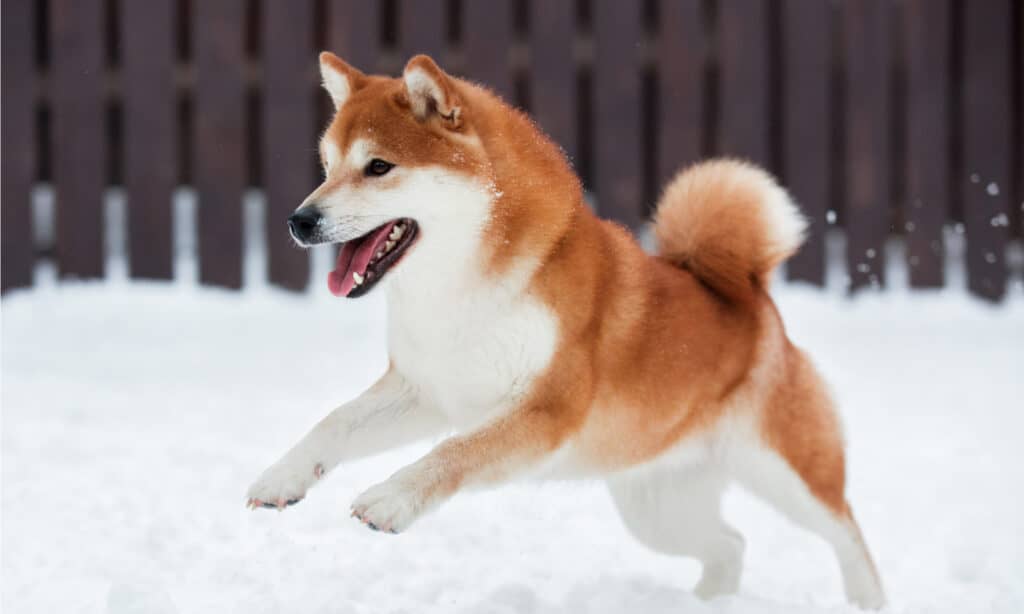
Shiba Inus tend to be playful, energetic, and impatient. The combination of these personality traits can pose additional risks of accidents.
©OlesyaNickolaeva/Shutterstock.com
Planning for unforeseen medical expenses is crucial for your Shiba Inu’s health, as purebred dogs often face more health issues than mixed breeds. Emergency vet bills can skyrocket, often reaching $2,500 or more. Considering pet insurance might be a wise choice if covering such high vet bills could be challenging.
Starting pet insurance at a young age can secure lower premiums. However, it’s important to keep in mind that premiums may increase over time. The yearly cost of pet insurance, starting from a young age, is $500.
Be sure to do your research when looking for pet insurance, as not all policies are equal. Read the fine print and look out for any exclusions or coverage limits. Make sure you understand what type of incidents will be covered by your policy, including accidents or illnesses. This way, you can make a well-informed decision about the right pet insurance plan for your furry friend.
Alternatively, setting aside a minimum of $5,000 in emergency savings for your Shiba’s lifetime is a viable option to cover unexpected medical costs.
How Much Does It Cost to Train a Shiba Inu?
Shiba Inus are an independent and stubborn breed. Without the right training, they may exhibit behavioral challenges that can become hard to fix. It’s vital to train your Shiba Inu to foster good behavior and earn their respect as their owner.
The price for dog training will vary based on your location. You can also train your dog on your own by taking online dog training courses, watching high-authority videos, or reading dog training books.
With that said, here is a breakdown of estimated dog training options:
- Dog training: $30-$75 per session
- Online dog training courses: $30-$200
- Dog training books: $10-$20
- Dog training DVDs: $20-$80
Shiba Inu Prices: The Grand Total of Owning a Shiba Inu
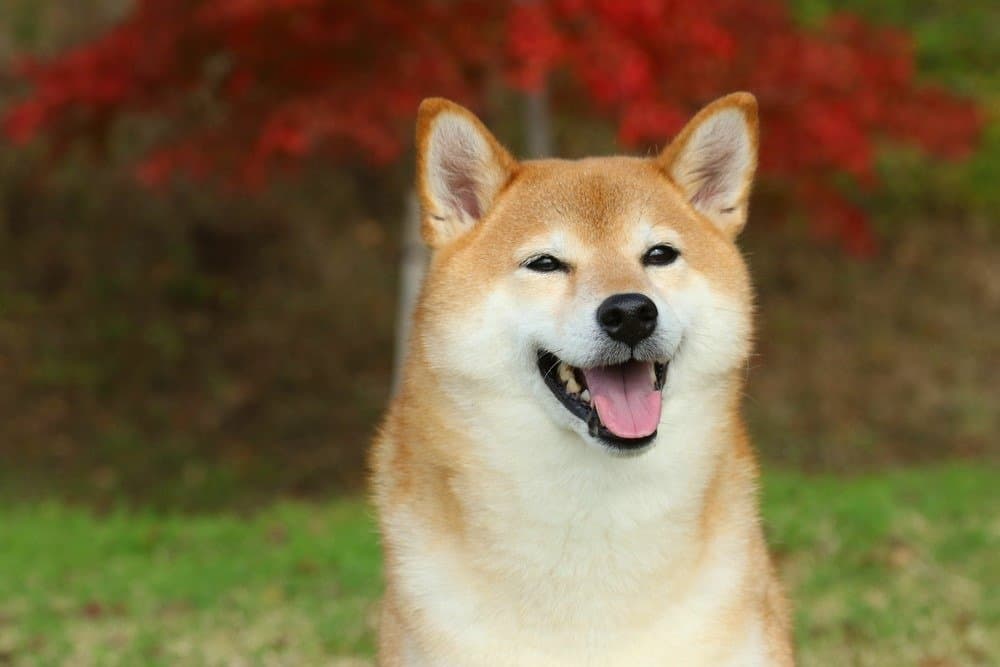
Shiba Inus require substantial investments — and not just financially.
©Rin Seiko/Shutterstock.com
The initial cost of acquiring a Shiba Inu, ranging from $2,000 to $6,000, is merely the beginning. Owning one requires a long-term financial and care commitment, with the annual care cost of an adult Shiba Inu estimated between $1,525 and $8,525, bringing the total first-year expenses to a range of $3,525 to $14,525.
It’s a significant investment not only financially but also in terms of time and commitment. Considering both the initial and ongoing costs is crucial to ensure a responsible and financially sound decision when bringing a Shiba Inu into your home. Unfortunately, many new owners underestimate this, leading to dogs being rehomed or abandoned at shelters.
It’s essential to assess your current and future finances and lifestyle before making a serious commitment. If your time constraints won’t allow for proper care of a Shiba or you can’t afford professional care assistance, it might be wise to postpone pet ownership until circumstances change.
The photo featured at the top of this post is © chendongshan/iStock / Getty Images Plus via Getty Images
Ready to discover the top 10 cutest dog breeds in the entire world?
How about the fastest dogs, the largest dogs and those that are -- quite frankly -- just the kindest dogs on the planet? Each day, AZ Animals sends out lists just like this to our thousands of email subscribers. And the best part? It's FREE. Join today by entering your email below.
Thank you for reading! Have some feedback for us? Contact the AZ Animals editorial team.






